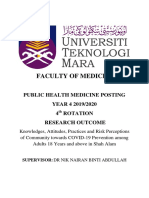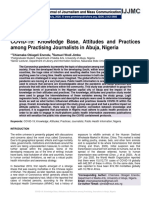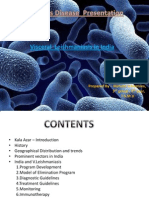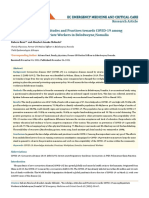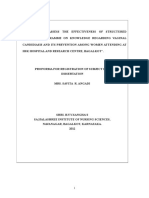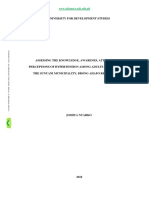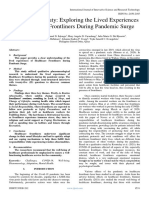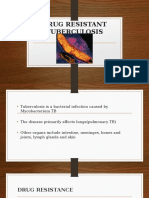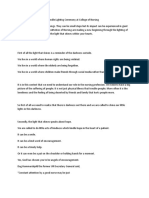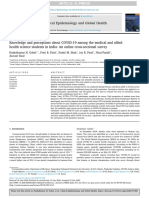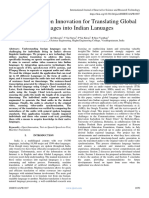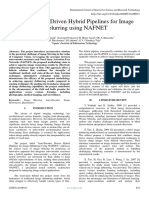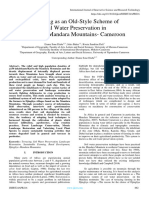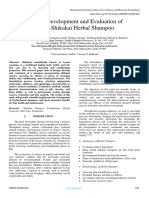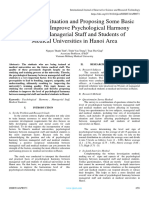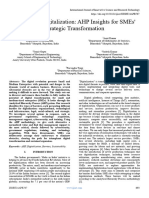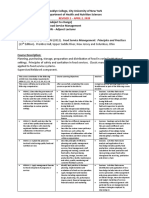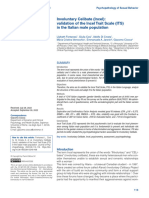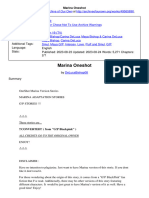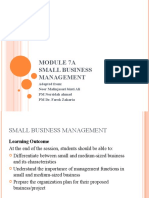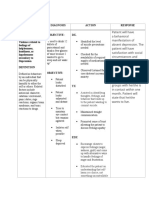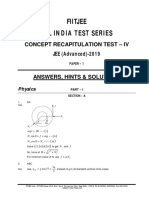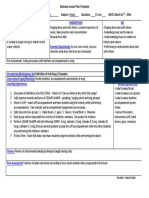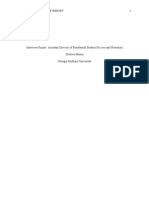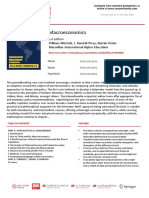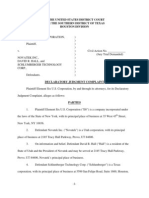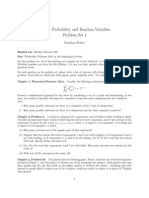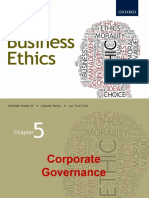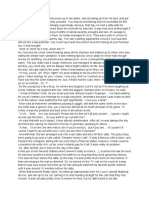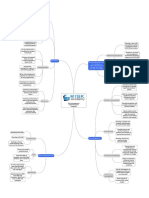Professional Documents
Culture Documents
Knowledge and Practice On Covid-19 Among General Public
Original Title
Copyright
Available Formats
Share this document
Did you find this document useful?
Is this content inappropriate?
Report this DocumentCopyright:
Available Formats
Knowledge and Practice On Covid-19 Among General Public
Copyright:
Available Formats
Volume 5, Issue 10, October – 2020 International Journal of Innovative Science and Research Technology
ISSN No:-2456-2165
Knowledge and Practice on Covid-19 among
General Public
1 2
ELIZEBETH RANI. V BLESSY LITTLE CHRISTY.P
M.SC (Nursing), Reader, V.H.S – M.A. M.SC (Nursing), Assistant Professor, V.H.S – M.A.
Chidambaram College of Nursing, Chennai, TamilNadu, Chidambaram College of Nursing, Chennai, TamilNadu,
India. India.
Abstract:- COVID-19 is associate communicable disease congestion, headache, sore throat, diarrhoea, and loss of style
caused by severe acute respiratory syndrome coronavirus. or smell, rash on the skin, or discoloration of fingers or toes.
It's currently a virulent disease unfold moving several Adults, older individuals, and people with underlying co-
countries globally. The aim of this study is to assess the morbidities like chronic respiratory organ illness,
knowledge and practices of COVID-19 among general cardiovascular disease diabetes, and cancer are additional
public at the selected setting, Chennai. The main objective probably to develop serious malady. Promoting information
was to assess the knowledge and practice on COVID-19, and higher health-seeking behaviour among the general
correlate the knowledge with practice on COVID-19, and public is important to assess their current state of awareness
associate the knowledge and practice on COVID-19 with and apply towards reducing the known gaps in information.
the demographic variables among the public. A
Quantitative non-experimental analysis style was used to Background of the Study
assess the knowledge and practice of COVID-19. Sixty Worldwide total cases crossed 38.2Million, recovered
individuals were chosen through the non-probability cases were 26.5Million, and therefore the deaths were
convenience sampling technique. The findings of the 1.09Million. Young adults represent associate progressively
analysis disclosed that the majority (40%) of the samples massive proportion of U.S. COVID-19 cases. the best human
had a high level of knowledge and 43.3% of them had a casualty reported from the USA with 109121 deaths. The
good practice, 33.3% of them had a moderate level of primary case of the COVID-19 pandemic in Asian nation was
knowledge and 30% of them had moderate practice, reported on January thirty, 2020. As of month, of May
whereas 26.7% of them had a low level of knowledge and seventeen, 2020, the Ministry of Health and Family Welfare,
26.7% of them had poor practice on COVID 19. Government of Asian nation has reported 90927 confirmed
cases from thirty-three states with 2872 deaths. Centres for
Keywords:- COVID-19, Knowledge, Practice, Pandemic, illness management associated interference (CDC) reports
General Public. national ensemble forecast indicates an unsure trend in new
COVID-19 cases reported over succeeding four weeks and
I. INTRODUCTION predicts that 160,000 to 380,000 new cases can probably be
reported throughout the week ending Gregorian calendar
“Emphasizing that whereas life is vital, resource is month thirty-one, 2020.
equally vital” a virulent disease is associate communicable
disease that's passing quickly from person to person in several Need for the Study
components of the globe. Coronaviruses or the novel Despite rising in COVID-19 cases, Governments across
coronavirus could be a massive family of viruses that causes the globe have undertaken curfew to limit the general public
respiratory disorder to additional severe diseases that are movement additionally provided consistent messages through
termed because the Middle East metabolism Syndrome numerous media is in a very bid to slow the virus
(MERS-CoV) and Severe Acute metabolism Syndrome transmission. Supported the review of live and case reports
(SARS-CoV). The globe Health Organization declared as and up to this point statistics, the investigator found that
COVID-19 that emerged from Wuhan town, Hubei Province folk’s adherence towards preventive measures and awareness
of China in Dec 2019 has caused new panic across the globe. has begun to say no and still, there's a swift in apply and this
Worldwide active cases were 38,532,773; deaths rate is is often a desire of the hour to extend widespread adoption of
1,093,051and the recovered cases were 28,957,379. health care interventions. Hence the investigator felt the
necessity to assess knowledge and practice on COVID- 19
Coronavirus is that the speedy transmission from human among the public to provide intensive health promotion
to human-made the globe Health Organization (WHO) to awareness that fosters attitudes among individuals to
declare this because the international public health emergency acknowledge and apply these measures properly.
and referred to as it a worldwide pandemic. The period of
time is a pair of to ten days and therefore the commonest
symptoms of COVID-19 are fever, dry cough, and temporary
state, and therefore the least symptoms body pains, nasal
IJISRT20OCT611 www.ijisrt.com 1217
Volume 5, Issue 10, October – 2020 International Journal of Innovative Science and Research Technology
ISSN No:-2456-2165
Statement
A study to assess the knowledge and practice on The second section assessed participants' information of
COVID-19 among general public at the selected setting, COVID-19. This section includes twenty-five things in terms
Chennai. of modes of transmission, clinical symptoms, treatment,
risk teams, isolation, prevention, and management.
Objective
1. To assess the knowledge and practice on COVID-19 The third section of the form assessed the respondents'
among the general public. practices. This section consisted of 20 statements related to
2. To correlate the knowledge and practice on COVID-19 practices .
among the general public.
3. To associate the knowledge and practice on COVID-19 Independent variables
with the demographic variables among the general public. Socio-demographic variables including age, gender,
instructional level, occupation, monthly financial gain, legal
Assumption status, social unit size, dietary pattern, previous information
The general public might have some information of on COVID-19, and sources of knowledge.
COVID nineteen.
Publics have totally different assumptions concerning Dependent variables
interference measures. Respondents were asked to retort to information things
Information concerning COVID – 19 varies from a as either true or false or not sure. correct answers were
personality's perception. allotted a score of one and Incorrect or not sure responses got
a score of zero. The score for knowledge ranged from zero to
II. METHODOLOGY twenty-five. With scores indicating a high, moderate, and
low level of knowledge on COVID-19. Things were
The analysis approach was Quantitative-evaluative in evaluated for internal reliability; the constant was 0.70.
nature. The study was conducted among sixty general public.
The population of the study was the general public within the In the section on practices, respondents were asked to
people of 21- 71years & higher in Chennai. A non-probability retort “always, sometimes, never.” A score of three, two, and
convenient sampling technique was utilized to choose the one assigned accordingly. The full score ranged from zero to
samples. The demographic variable was collected employing twenty, with the scores indicating good practices, moderate
a structured form. The rating scale was applied to assess practice, and poor practice.
knowledge. A check list was applied to assess the practice.
Demography, knowledge & practice questionnaire was III. DATA ANALYSIS
collected via on-line employing a self-reported form, from
sixty participants through a Google type. A survey link was This study utilized primarily descriptive and inferential
sent to the respondents, via email and WhatsApp teams. statistics for information analysis. Descriptive analysis was
applied to tabulate the frequency and percentage of
The self-reported form was developed by the authors, in demographic variables. Pearson correlation was exercised to
line with the rules of the community of COVID-19, by the assess the relationship between knowledge and practice. A
guidance of World Health Organization. On the primary page Chi-square test was utilized to assess the knowledge and
of the web form, respondents were enlightened concerning practice with demographic variables. SPSS software was
the background and objectives of the study. Respondents utilized to analyze the data.
were enlightened that they were unengaged to withdraw at
any time, while not giving a reason, and every one info and Ethical Concerns
opinions provided would be anonymous and confidential. Informed Consent was obtained from the
Respondents living in Chennai, aged twenty-one years to participants and also the confidentiality and privacy of
older, understood the content of the form and united to the samples were maintained throughout the study.
participate within the study and they were instructed to
complete the form. on-line consent was obtained before IV. RESULT
proceeding with the form.
The majority (50%) of the samples were between the
The form consisted of three primary sections. The first age group of 31- 40 years. Participants 60% were female and
primary section assessed socio-demographic characteristics 83.3% were married, 86.7% were graduates, 36.7% were
from respondents’ including age, gender, instructional level, employed in private jobs and 56.7% of the samples got
occupation, monthly financial gain, legal status, social Rs.20001 & above, 70% of the sample’s household size
unit size, dietary pattern, previous information on COVID-19, includes 3-5 people and 96.7% were non-vegetarians,
and sources of obtained info. whereas 76.6% of them had previous knowledge and out of
that 66.7% of them had obtained information through mass
media.
IJISRT20OCT611 www.ijisrt.com 1218
Volume 5, Issue 10, October – 2020 International Journal of Innovative Science and Research Technology
ISSN No:-2456-2165
Assessment Of Knowledge On Covid-19 educational level and marital status had influenced the
knowledge of COVID-19.
There was no statistically significant association
between knowledge with demographic variables like age,
gender, occupation, monthly financial gain, social unit size,
dietary pattern, previous information and sources of
knowledge.
There was a statistically significant association between
practice with age at p<0.01 level and former information at
p<0.001 level. It displayed that age and former information
had influenced the practice of COVID19. There was no
statistically significant association between practice with
Figure 1: Knowledge On Covid -19 demographic variables like gender, occupation, monthly
financial gain, social unit size, dietary pattern, and sources of
Figure one showed that majority (40%) of the samples knowledge.
had a high level of data, 33.3% of them had a moderate
level of data and 26.7% of them had an occasional level of V. DISCUSSION
data on COVID - 19.
COVID-19 is a rising communicable disease that has
Assessment Of Practice On Covid-19 had a big threat to the public health. The absence of a
COVID-19 immunogen, preventive measures playing an
important role in reducing infection. This means the need of
public awareness for prevention of COVID19, by information
and day to day practices. Thus, this study was aimed to assess
the knowledge and practice of COVID-19.
The findings of the study based on objectives were
mentioned
The first objective was to assess the information and
observe on COVID19
Our finding indicates that 40% had a high
level of knowledge and 43.3% of the samples had a good
practice. The above finding supported by, Balvir Singh
Figure: 2 Practice On Covid-19 Tomar et al. conducted a study among the Indian community
was information, angle & observe towards COVID-19was
Figure two showed that Majority (43.3%) of the assessed. Among 7978 participants, the information, attitude,
samples had a good practice, 30% of them had moderate and observe score was eighty.64%, 97.33%, and 93.8%
practice and 26.7% of them had poor practice on COVID-19. consecutively (4). The bulk of the Indian population
incontestable preceded sensible information, positive angle,
TABLE: 1:- CORRELATION OF KNOWLEDGE AND and sensible observe concerning the COVID-19 pandemic (4).
PRACTICE ON COVID-19
We found that those who had good knowledge that
S.NO VARIABLES CORRELATION
influenced to keep them safety and well-practiced during
COEFFICIENT VALUE
COVID 19 pandemic. These results have come because of
1. Knowledge r = 0.451
their educational status (degree - 86.7%) and the age (31 –
2. Practice p = 0.01**S
40 yrs.). People might have known about the disease & its
* p<0.05, **p<0.01, ***p<0.001 S - Significant NS - Not transmission and prevention through television, newspaper
Significant and social media.
There was a positive correlation between knowledge The second objective was to correlate the knowledge and
and practice, r = 0. 451 at the level of 0.01. practice on COVID19
The correlation between knowledge and practice
Association Of The Knowledge And Practice On Covid- exposed that there was a positive correlational
19 With The Demographic Variables: statistic existing between knowledge and practice r = 0.451 at
The study findings showed that there was a statistically p<0.01 level of significance. It showed that the participants
significant association between knowledge with education high level of knowledge had influenced in sensible and safe
and marital status at p<0.001 level. It exposed that practices on COVID-19 pandemic.
IJISRT20OCT611 www.ijisrt.com 1219
Volume 5, Issue 10, October – 2020 International Journal of Innovative Science and Research Technology
ISSN No:-2456-2165
The above study findings have supported by, Balvir REFERENCES
Singh Tomar et al. conducted a study among the Indian
community wherever information, angle & observe assessed [1]. Mohammed K. Al-Hanawi, Khadijah Angawi and Noor
towards COVID-19. There was a positive correlation Alshareef et al. Knowledge, Attitude and Practice
between knowledge-attitude, knowledge-practice, and angle Toward COVID-19 Among the Public in the Kingdom of
observe with the strongest relation known between observe Saudi Arabia: A Cross-Sectional Study. Front Public
and angle. Categorical by Pearson’s correlation, the Health. 2020; 8: 217. Published online 2020 May
information score correlation with angle (r=0.023: p<0.01) 27. DOI: 10.3389/fpubh.2020.00217.
and observe (r=0.019: p<0.01). Moreover, the observe score [2]. Rajib Acharya1, Mukta Gundi1, Thoai D. Ngo2,
was completely correlate with angle (r=0.361: p=0.03 (4). Neelanjana Pandey1, Sangram K. Patel1, Jessie
Pinchoff2, Shilpi Rampal1, Niranjan Saggurti1,3, K.G.
The third objective was to associate the knowledge and Santhya1,3, Corinne White2, A.J.F. Zavier1. COVID-19-
practice with the demographic variables. related knowledge, attitudes, and practices among
The study findings showed that there was a statistically adolescents and young people in Bihar and Uttar
significant association between knowledge with education Pradesh, India1 Study Description April 23, 2020.
and marital status at p<0.001 level. It displayed that [3]. Sonam Maheshwari1, Puneet Kumar Gupta2, Richa
educational level and marital status had influenced the Sinha1, Pravesh Rawat. Knowledge, attitude, and practice
information of COVID-19. There was a significant towards coronavirus disease 2019 (COVID-19) among
association between practice with age at p<0.01 level and medical students: A cross-sectional study. Journal of
previous knowledge at p<0.001 level. It unconcealed that age acute disease. Year : 2020 | Volume : 9 | Issue : 3
and former information had influenced the knowledge of | Page : 100-104.
COVID-19. [4]. Balvir Singh Tomar, Pratima Singh, Supriya Suman,
Preeti Raj, Deepak Nathiya, Sandeep Tripathi, Dushyant
There was no statistically significant association Singh Chauhan. Indian community's Knowledge,
between knowledge with demographic variables like age, Attitude & Practice towards COVID-19. medRX iv
gender, occupation, monthly financial gain, social unit size, DOI: https://doi.org/10.1101/2020.05.05.20092122.
dietary pattern, previous information and sources of [5]. Adela Ngwewondo et al. Knowledge, attitudes, practices
knowledge. There was no statistically significant association of/towards COVID 19 preventive measures and
between practice with demographic variables like gender, symptoms: A cross-sectional study during the
occupation, monthly financial gain, social unit size, dietary exponential rise of the outbreak in Cameroon. PLOS
pattern, and sources of knowledge. Neglected Tropical Diseases. September 4, 2020
https://doi.org/10.1371/journal.pntd.0008700
Limitations
There were no limitations round-faced by the
investigator throughout the study.
VI. CONCLUSION
This study was used to investigate the knowledge and
practice of the COVID-19 outbreak, among the general
population of Chennai, Tamil Nadu. Our findings suggested
that 40% of the samples had good knowledge and 43.3% of
them had good practices toward COVID-19. Around 60% of
the respondents were unaware about the diseases.
Knowledge of the disease is considered the first
stepping stone to come out from the diseases. Because
Knowing the causes, transmission and sources of disease
increases the awareness of the spread of communicable
diseases, and of the preventive measures to slow down the
transmission. So, we are pleased to suggest that the health
education to be given by effectively using of social medias,
newspaper and distributing pamphlets.
IJISRT20OCT611 www.ijisrt.com 1220
You might also like
- A Study of the Lack of Hiv/Aids Awareness Among African American Women: a Leadership Perspective: Awareness That All Cultures Should Know AboutFrom EverandA Study of the Lack of Hiv/Aids Awareness Among African American Women: a Leadership Perspective: Awareness That All Cultures Should Know AboutRating: 5 out of 5 stars5/5 (1)
- Report KAP COVID-19 Among The Community of Shah AlamDocument45 pagesReport KAP COVID-19 Among The Community of Shah AlamAdriana AfiqahNo ratings yet
- Management of Tuberculosis: A guide for clinicians (eBook edition)From EverandManagement of Tuberculosis: A guide for clinicians (eBook edition)No ratings yet
- Knowledge and Practice of Nursing Personnel On COVID-19 OnLINE DESCRIPTIVE STUDYDocument8 pagesKnowledge and Practice of Nursing Personnel On COVID-19 OnLINE DESCRIPTIVE STUDYInternational Journal of Innovative Science and Research TechnologyNo ratings yet
- Covid-19 and Attitudes of Ground-Level Public Health Staff in Sri LankaDocument6 pagesCovid-19 and Attitudes of Ground-Level Public Health Staff in Sri LankaIJAR JOURNALNo ratings yet
- KAP Analysis of Covid-19Document9 pagesKAP Analysis of Covid-19Bhaskar ReddyNo ratings yet
- Knowledge, Attitude, and Practices Towards The COVID-19 Pandemic Among Undergraduate StudentsDocument7 pagesKnowledge, Attitude, and Practices Towards The COVID-19 Pandemic Among Undergraduate StudentsLulu RakhmillaNo ratings yet
- Knowledge, Attitude and Practice About Covid-19 and Vaccine Acceptance Among Family Physician in Al-MadinahDocument9 pagesKnowledge, Attitude and Practice About Covid-19 and Vaccine Acceptance Among Family Physician in Al-MadinahIJAR JOURNALNo ratings yet
- COVID-19: Knowledge Base, Attitudes and Practices Among Practising Journalists in Abuja, NigeriaDocument13 pagesCOVID-19: Knowledge Base, Attitudes and Practices Among Practising Journalists in Abuja, NigeriaPremier PublishersNo ratings yet
- HIV/AIDS Determinants and Control FactorsDocument4 pagesHIV/AIDS Determinants and Control FactorsahiNo ratings yet
- Visceral Leishmaniasis in IndiaDocument27 pagesVisceral Leishmaniasis in IndiaNishant SrivastavaNo ratings yet
- A Research On Compliance With Hand Washing Among Health Care Workers During Routine Patient CareDocument39 pagesA Research On Compliance With Hand Washing Among Health Care Workers During Routine Patient CareSiddharth Tewari100% (3)
- A Prospective Study of Prescribing Pattern in The Management of Stroke at A Tertiary Care HospitalDocument6 pagesA Prospective Study of Prescribing Pattern in The Management of Stroke at A Tertiary Care HospitalInternational Journal of Innovative Science and Research TechnologyNo ratings yet
- Rising AboveDocument123 pagesRising AboveDomingo PlomantesNo ratings yet
- Respiratory Distress in NewbornDocument52 pagesRespiratory Distress in NewbornNadia SalwaniNo ratings yet
- Final Research Copy - Backup RepairDocument163 pagesFinal Research Copy - Backup Repair19006 Sahel GamitNo ratings yet
- Hyperthyroidism Causes, Symptoms, Diagnosis and TreatmentDocument40 pagesHyperthyroidism Causes, Symptoms, Diagnosis and TreatmentEmmanuelNo ratings yet
- EpdsDocument2 pagesEpdsapi-254209971No ratings yet
- Antihypertension Non AdherenceDocument16 pagesAntihypertension Non AdherencebezieNo ratings yet
- Questionnaire On The Knowledge, Attitude, and Practices Towards COVID-19Document4 pagesQuestionnaire On The Knowledge, Attitude, and Practices Towards COVID-19Mae GonzalesNo ratings yet
- Knowledge, Attitudes and Practices Towards COVID-19 Among Expatriate Workers in Beledweyne/SomaliaDocument13 pagesKnowledge, Attitudes and Practices Towards COVID-19 Among Expatriate Workers in Beledweyne/SomaliaKABERA RENENo ratings yet
- A Cross-Sectional Survey of Knowledge, Attitude and Practice Associated With COVID-19 Among Undergraduate Students in ChinaDocument8 pagesA Cross-Sectional Survey of Knowledge, Attitude and Practice Associated With COVID-19 Among Undergraduate Students in Chinaandris mejia alvarezNo ratings yet
- BANS-184 Important QuestionsDocument31 pagesBANS-184 Important QuestionsRahul Singh RajputNo ratings yet
- Immunization and Its Importance: A Literature ReviewDocument5 pagesImmunization and Its Importance: A Literature ReviewIJRASETPublicationsNo ratings yet
- Diabetes Mellitus ResearchDocument6 pagesDiabetes Mellitus ResearchJohnNo ratings yet
- Dengue ArticleDocument16 pagesDengue ArticleJobelAringoNuvalNo ratings yet
- Acceptance and Attitude Toward Covid-19 Vaccination: A Cross-Sectional Study From Udaipur DistrictDocument8 pagesAcceptance and Attitude Toward Covid-19 Vaccination: A Cross-Sectional Study From Udaipur DistrictIJAR JOURNALNo ratings yet
- Knowledge, Attitude and Practices of Students Enrolled in Health Related Courses at Saint Louis University Towards Human Papillomavirus (Philippines)Document8 pagesKnowledge, Attitude and Practices of Students Enrolled in Health Related Courses at Saint Louis University Towards Human Papillomavirus (Philippines)Alexander DeckerNo ratings yet
- Essential Update: Pediatric Pneumonia May Be Effectively Treated With Twice-Daily AmoxicillinDocument54 pagesEssential Update: Pediatric Pneumonia May Be Effectively Treated With Twice-Daily AmoxicillinYostesara Maurena SantosaNo ratings yet
- Sexually Transmitted InfectionsDocument34 pagesSexually Transmitted InfectionsMariana Creciun100% (1)
- RCH program goals for reproductive health and child survivalDocument2 pagesRCH program goals for reproductive health and child survivalAnnapurna DangetiNo ratings yet
- 05 N037 38983Document22 pages05 N037 38983MeghaNo ratings yet
- The Normal Anthropometric Measurements For HealthyDocument43 pagesThe Normal Anthropometric Measurements For HealthyAli Mohamed BurhanNo ratings yet
- 2011 Nosocomial Infections - Knowledge and Source of Information Among Clinical Health Care Students in GhanaDocument4 pages2011 Nosocomial Infections - Knowledge and Source of Information Among Clinical Health Care Students in GhanaMostafa AbdelrahmanNo ratings yet
- The Problem and Its BackgroundDocument46 pagesThe Problem and Its Backgroundharoldpaulo100% (1)
- Vijaya College of Nursing: Course Subject Unit Bio-Psycho Social PathophysiologyDocument3 pagesVijaya College of Nursing: Course Subject Unit Bio-Psycho Social PathophysiologyReshma Rinu50% (2)
- University For Development Studies: WWW - Udsspace.uds - Edu.ghDocument149 pagesUniversity For Development Studies: WWW - Udsspace.uds - Edu.ghAmeliaNo ratings yet
- Benefit Packages For Inpatient Care of Probable and Confirmed COVID-19 Developing Severe Illness / OutcomesDocument31 pagesBenefit Packages For Inpatient Care of Probable and Confirmed COVID-19 Developing Severe Illness / OutcomesGeneXpert Lab LCPNo ratings yet
- Allergic RhinitisDocument22 pagesAllergic RhinitissuciNo ratings yet
- Presentation Intro TuberculosisDocument8 pagesPresentation Intro TuberculosisEidi IdhamNo ratings yet
- Vanguards of Duty Exploring The Lived Experiences of Healthcare Frontliners During Pandemic SurgeDocument15 pagesVanguards of Duty Exploring The Lived Experiences of Healthcare Frontliners During Pandemic SurgeInternational Journal of Innovative Science and Research TechnologyNo ratings yet
- Phototherapy For Neonatal JaundiceDocument5 pagesPhototherapy For Neonatal JaundiceMichael RameresNo ratings yet
- Nosocomial Infection?Document4 pagesNosocomial Infection?Sara ANo ratings yet
- Descriptive EpidemiologyDocument7 pagesDescriptive EpidemiologyVineeta JoseNo ratings yet
- Lecture 1 - InfluenzaDocument67 pagesLecture 1 - InfluenzaShaimaa AbdulkadirNo ratings yet
- Guidelines GonoDocument6 pagesGuidelines GonoFen NavarreteNo ratings yet
- And The Band Played OnDocument2 pagesAnd The Band Played OnRider NoaNo ratings yet
- Field Visits, Field Report Writing. LSN 10Document23 pagesField Visits, Field Report Writing. LSN 10Mokua FedinardNo ratings yet
- COPD: Chronic Obstructive Pulmonary DiseaseDocument3 pagesCOPD: Chronic Obstructive Pulmonary DiseaseRichard TanNo ratings yet
- Awareness of Kirkuk Technical Institute Female Students Regarding Polycystic Ovarian Syndrome (PCOS)Document9 pagesAwareness of Kirkuk Technical Institute Female Students Regarding Polycystic Ovarian Syndrome (PCOS)Central Asian StudiesNo ratings yet
- Drug Resistant TuberculosisDocument58 pagesDrug Resistant TuberculosisbharatnarayananNo ratings yet
- Philippine College of Health Science IncDocument23 pagesPhilippine College of Health Science Incpeter bruceNo ratings yet
- Assessing stress and coping in children during the COVID-19 lockdown (39Document19 pagesAssessing stress and coping in children during the COVID-19 lockdown (39shivani banerNo ratings yet
- Pap SmearDocument3 pagesPap SmearcziehjheyNo ratings yet
- An Inspiring SPDocument3 pagesAn Inspiring SPJoemar De Pascion NovillaNo ratings yet
- Female Work-Force Participation in RuralDocument32 pagesFemale Work-Force Participation in RuralAnonymous EAineTizNo ratings yet
- B12.Knowledge and Perceptions About COVID-19 Among The Medical and Allied Health Science Students in IndiaDocument6 pagesB12.Knowledge and Perceptions About COVID-19 Among The Medical and Allied Health Science Students in IndiaWislianaNo ratings yet
- Familiarity of Selected Indangeños To Covid-19 Pandemic TerminologiesDocument37 pagesFamiliarity of Selected Indangeños To Covid-19 Pandemic TerminologiesHARVIN ERROL CARANDANGNo ratings yet
- Advpub JE20200148Document9 pagesAdvpub JE20200148STIKes Santa Elisabeth MedanNo ratings yet
- An Analysis on Mental Health Issues among IndividualsDocument6 pagesAn Analysis on Mental Health Issues among IndividualsInternational Journal of Innovative Science and Research TechnologyNo ratings yet
- Harnessing Open Innovation for Translating Global Languages into Indian LanuagesDocument7 pagesHarnessing Open Innovation for Translating Global Languages into Indian LanuagesInternational Journal of Innovative Science and Research TechnologyNo ratings yet
- Diabetic Retinopathy Stage Detection Using CNN and Inception V3Document9 pagesDiabetic Retinopathy Stage Detection Using CNN and Inception V3International Journal of Innovative Science and Research TechnologyNo ratings yet
- Investigating Factors Influencing Employee Absenteeism: A Case Study of Secondary Schools in MuscatDocument16 pagesInvestigating Factors Influencing Employee Absenteeism: A Case Study of Secondary Schools in MuscatInternational Journal of Innovative Science and Research TechnologyNo ratings yet
- Exploring the Molecular Docking Interactions between the Polyherbal Formulation Ibadhychooranam and Human Aldose Reductase Enzyme as a Novel Approach for Investigating its Potential Efficacy in Management of CataractDocument7 pagesExploring the Molecular Docking Interactions between the Polyherbal Formulation Ibadhychooranam and Human Aldose Reductase Enzyme as a Novel Approach for Investigating its Potential Efficacy in Management of CataractInternational Journal of Innovative Science and Research TechnologyNo ratings yet
- The Making of Object Recognition Eyeglasses for the Visually Impaired using Image AIDocument6 pagesThe Making of Object Recognition Eyeglasses for the Visually Impaired using Image AIInternational Journal of Innovative Science and Research TechnologyNo ratings yet
- The Relationship between Teacher Reflective Practice and Students Engagement in the Public Elementary SchoolDocument31 pagesThe Relationship between Teacher Reflective Practice and Students Engagement in the Public Elementary SchoolInternational Journal of Innovative Science and Research TechnologyNo ratings yet
- Dense Wavelength Division Multiplexing (DWDM) in IT Networks: A Leap Beyond Synchronous Digital Hierarchy (SDH)Document2 pagesDense Wavelength Division Multiplexing (DWDM) in IT Networks: A Leap Beyond Synchronous Digital Hierarchy (SDH)International Journal of Innovative Science and Research TechnologyNo ratings yet
- Comparatively Design and Analyze Elevated Rectangular Water Reservoir with and without Bracing for Different Stagging HeightDocument4 pagesComparatively Design and Analyze Elevated Rectangular Water Reservoir with and without Bracing for Different Stagging HeightInternational Journal of Innovative Science and Research TechnologyNo ratings yet
- The Impact of Digital Marketing Dimensions on Customer SatisfactionDocument6 pagesThe Impact of Digital Marketing Dimensions on Customer SatisfactionInternational Journal of Innovative Science and Research TechnologyNo ratings yet
- Electro-Optics Properties of Intact Cocoa Beans based on Near Infrared TechnologyDocument7 pagesElectro-Optics Properties of Intact Cocoa Beans based on Near Infrared TechnologyInternational Journal of Innovative Science and Research TechnologyNo ratings yet
- Formulation and Evaluation of Poly Herbal Body ScrubDocument6 pagesFormulation and Evaluation of Poly Herbal Body ScrubInternational Journal of Innovative Science and Research TechnologyNo ratings yet
- Advancing Healthcare Predictions: Harnessing Machine Learning for Accurate Health Index PrognosisDocument8 pagesAdvancing Healthcare Predictions: Harnessing Machine Learning for Accurate Health Index PrognosisInternational Journal of Innovative Science and Research TechnologyNo ratings yet
- The Utilization of Date Palm (Phoenix dactylifera) Leaf Fiber as a Main Component in Making an Improvised Water FilterDocument11 pagesThe Utilization of Date Palm (Phoenix dactylifera) Leaf Fiber as a Main Component in Making an Improvised Water FilterInternational Journal of Innovative Science and Research TechnologyNo ratings yet
- Cyberbullying: Legal and Ethical Implications, Challenges and Opportunities for Policy DevelopmentDocument7 pagesCyberbullying: Legal and Ethical Implications, Challenges and Opportunities for Policy DevelopmentInternational Journal of Innovative Science and Research TechnologyNo ratings yet
- Auto Encoder Driven Hybrid Pipelines for Image Deblurring using NAFNETDocument6 pagesAuto Encoder Driven Hybrid Pipelines for Image Deblurring using NAFNETInternational Journal of Innovative Science and Research TechnologyNo ratings yet
- Terracing as an Old-Style Scheme of Soil Water Preservation in Djingliya-Mandara Mountains- CameroonDocument14 pagesTerracing as an Old-Style Scheme of Soil Water Preservation in Djingliya-Mandara Mountains- CameroonInternational Journal of Innovative Science and Research TechnologyNo ratings yet
- A Survey of the Plastic Waste used in Paving BlocksDocument4 pagesA Survey of the Plastic Waste used in Paving BlocksInternational Journal of Innovative Science and Research TechnologyNo ratings yet
- Hepatic Portovenous Gas in a Young MaleDocument2 pagesHepatic Portovenous Gas in a Young MaleInternational Journal of Innovative Science and Research TechnologyNo ratings yet
- Design, Development and Evaluation of Methi-Shikakai Herbal ShampooDocument8 pagesDesign, Development and Evaluation of Methi-Shikakai Herbal ShampooInternational Journal of Innovative Science and Research Technology100% (3)
- Explorning the Role of Machine Learning in Enhancing Cloud SecurityDocument5 pagesExplorning the Role of Machine Learning in Enhancing Cloud SecurityInternational Journal of Innovative Science and Research TechnologyNo ratings yet
- A Review: Pink Eye Outbreak in IndiaDocument3 pagesA Review: Pink Eye Outbreak in IndiaInternational Journal of Innovative Science and Research TechnologyNo ratings yet
- Automatic Power Factor ControllerDocument4 pagesAutomatic Power Factor ControllerInternational Journal of Innovative Science and Research TechnologyNo ratings yet
- Review of Biomechanics in Footwear Design and Development: An Exploration of Key Concepts and InnovationsDocument5 pagesReview of Biomechanics in Footwear Design and Development: An Exploration of Key Concepts and InnovationsInternational Journal of Innovative Science and Research TechnologyNo ratings yet
- Mobile Distractions among Adolescents: Impact on Learning in the Aftermath of COVID-19 in IndiaDocument2 pagesMobile Distractions among Adolescents: Impact on Learning in the Aftermath of COVID-19 in IndiaInternational Journal of Innovative Science and Research TechnologyNo ratings yet
- Studying the Situation and Proposing Some Basic Solutions to Improve Psychological Harmony Between Managerial Staff and Students of Medical Universities in Hanoi AreaDocument5 pagesStudying the Situation and Proposing Some Basic Solutions to Improve Psychological Harmony Between Managerial Staff and Students of Medical Universities in Hanoi AreaInternational Journal of Innovative Science and Research TechnologyNo ratings yet
- Navigating Digitalization: AHP Insights for SMEs' Strategic TransformationDocument11 pagesNavigating Digitalization: AHP Insights for SMEs' Strategic TransformationInternational Journal of Innovative Science and Research Technology100% (1)
- Drug Dosage Control System Using Reinforcement LearningDocument8 pagesDrug Dosage Control System Using Reinforcement LearningInternational Journal of Innovative Science and Research TechnologyNo ratings yet
- The Effect of Time Variables as Predictors of Senior Secondary School Students' Mathematical Performance Department of Mathematics Education Freetown PolytechnicDocument7 pagesThe Effect of Time Variables as Predictors of Senior Secondary School Students' Mathematical Performance Department of Mathematics Education Freetown PolytechnicInternational Journal of Innovative Science and Research TechnologyNo ratings yet
- Formation of New Technology in Automated Highway System in Peripheral HighwayDocument6 pagesFormation of New Technology in Automated Highway System in Peripheral HighwayInternational Journal of Innovative Science and Research TechnologyNo ratings yet
- Is There a Batak HistoryDocument14 pagesIs There a Batak HistoryMWahdiniPurbaNo ratings yet
- Brooklyn College - Syllabus 3250 - Revised 2Document8 pagesBrooklyn College - Syllabus 3250 - Revised 2api-535264953No ratings yet
- Examen Tema 3 Ingles EnzoDocument3 pagesExamen Tema 3 Ingles EnzoMartinEnzo GuerraNo ratings yet
- 01 FontanesiDocument7 pages01 FontanesizegorszyNo ratings yet
- Marina OneshotDocument11 pagesMarina OneshotchewyeblossomNo ratings yet
- Conditions of Contract For: ConstructionDocument30 pagesConditions of Contract For: Constructionvladimir100% (2)
- Introduction to Machine LearningDocument30 pagesIntroduction to Machine LearningHafisIzranNo ratings yet
- Derrida Large DeviationsDocument13 pagesDerrida Large Deviationsanurag sahayNo ratings yet
- Module 7A Small Business Management: Adopted From: Noor Malinjasari Binti Ali PM Norsidah Ahmad PM Dr. Farok ZakariaDocument20 pagesModule 7A Small Business Management: Adopted From: Noor Malinjasari Binti Ali PM Norsidah Ahmad PM Dr. Farok ZakariafaizNo ratings yet
- Dalai Lama Personality TestDocument2 pagesDalai Lama Personality TestKristine Joy TumbagaNo ratings yet
- Plotting and Model Building in MATLABDocument30 pagesPlotting and Model Building in MATLABMuhammad Shehzad KamalNo ratings yet
- Patient Risk for Self-Directed ViolenceDocument2 pagesPatient Risk for Self-Directed ViolenceGrape JuiceNo ratings yet
- English 3-Q4-L7 ModuleDocument19 pagesEnglish 3-Q4-L7 ModuleZosima Abalos100% (1)
- Fiitjee All India Test Series: Concept Recapitulation Test - Iv JEE (Advanced) - 2019Document13 pagesFiitjee All India Test Series: Concept Recapitulation Test - Iv JEE (Advanced) - 2019Raj KumarNo ratings yet
- Morphology of The Robot, Transmission, Actuators and SensorsDocument11 pagesMorphology of The Robot, Transmission, Actuators and SensorsErick NegreteNo ratings yet
- People V Pugay DigestDocument2 pagesPeople V Pugay DigestSecret SecretNo ratings yet
- American Folk Song Lesson PlanDocument1 pageAmerican Folk Song Lesson Planapi-2844060150% (1)
- Module3 MasonDocument6 pagesModule3 Masonapi-495936445No ratings yet
- Macroeconomics 1st Edition Ebook or PaperbackDocument1 pageMacroeconomics 1st Edition Ebook or PaperbackSurya DarmaNo ratings yet
- Element Six v. Novatek Et. Al.Document26 pagesElement Six v. Novatek Et. Al.PriorSmartNo ratings yet
- Macroeconomics Dde PDFDocument253 pagesMacroeconomics Dde PDFPankaj GahlautNo ratings yet
- What is Meningitis? Understanding Causes, Symptoms and TreatmentDocument15 pagesWhat is Meningitis? Understanding Causes, Symptoms and Treatmentnaveen chaudharyNo ratings yet
- The Innovator's Secret WeaponDocument9 pagesThe Innovator's Secret WeaponNaval VaswaniNo ratings yet
- Ps 1Document2 pagesPs 1woowuwooNo ratings yet
- Steps in Formatting Windows 7Document2 pagesSteps in Formatting Windows 7Marc RiomalosNo ratings yet
- Circap Report 06Document28 pagesCircap Report 06Mónica SinisterraNo ratings yet
- Chapter5 EthDocument30 pagesChapter5 EthVictoriasecret PerfumeNo ratings yet
- Kohai X Shyn Fanfic - Love Has No SubtitlesDocument2 pagesKohai X Shyn Fanfic - Love Has No SubtitlesAlikkryn ValdinisneiNo ratings yet
- RISK-ACADEMY - Risk Management RoadmapDocument1 pageRISK-ACADEMY - Risk Management RoadmapcezarzanioloNo ratings yet
- The Abington Journal 04-20-2011Document28 pagesThe Abington Journal 04-20-2011The Times LeaderNo ratings yet

